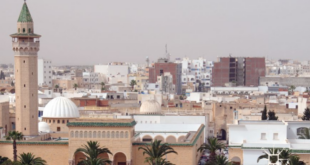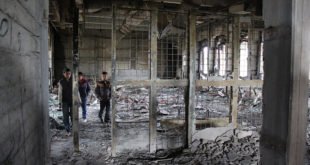Within the larger debate over the American-led war in Iraq, the question of the media and its coverage of the war has often been as contentious as the war itself. Major Amy Connelly is the commander of the US Army’s 204th Public Affairs Detachment. From January 2004 until February 2005, Major Connelly served as the deputy director of the Press Center in Baghdad and also ran the Coalition Press Information Center. During her time in Baghdad, Major Connelly saw firsthand the way in which the media—both in the West and in the Arabic-speaking world—covered the war in the aftermath of the American-led military operations that ended the rule of Saddam Hussein. TBS contributing editor and Iraq War veteran Andrew Exum interviewed Major Connelly for TBS about the war and the media in the chaos of Iraq.
TBS: Major Connelly, if I can start off with a somewhat general question, what has been your overall impression of the way the media has covered the Iraq War so far?
AC: I would say my single biggest impression is that they are not telling the entire story. But that’s not a criticism. I think it would be really naïve to say that a legitimate news agency—and the criticism that people have is that they’re not covering school openings or the building of bridges—is going to cover those things when a car bomb has exploded and people have died. Now, the loss of life or limb isalways the most important thing, even if there are other powerful events going on. So I don’t think their choice of coverage is necessarily wrong, but it doesn’t give the full spectrum of what is happening in Iraq.
TBS: But some news agencies say that it’s impossible or at least difficult for them to cover the so-called “good news” stories because if they, for instance, visit a school in Iraq that’s just opening, the teachers will tell them: “Don’t come here again, because if the insurgents see this on the news, they’ll target our school.”
AC: The press corps in Iraq is obviously operating under a lot of constraint. And incidentally, that would probably be true. Overall, for whatever reason, the whole story is not being told … but I don’t think their choice of what they’re telling is necessarily incorrect.
TBS: Well, do you think the media coverage has changed in tone over time with regard to before the invasion, during the invasion, and now during what I guess we can call the state-building phase?
AC: Well, prior to US forces going into Iraq, and prior to the liberation of Baghdad, I can’t really speak to the media’s coverage, because at the time I was still part of the media audience. I arrived [in Iraq] about six months into it. And I can say that coverage evolved while I was there.
TBS: In what way?
AC: There was a lot more coverage of the political process they’re trying to establish in Iraq. What became very important were the political structures they’re trying to put into place. And so there was more focus on that. For example, Al Iraqiyya elected to function as the C-SPAN of the National Assembly.(1) And since they were an Iraqi-run station, other stations starting picking up on their feed. At first, they weren’t the most technologically advanced news network. But they advanced with the help of a lot of other news networks. CNN helped them out … Fox News helped them out … making sure they came up to speed, technologically speaking, with the rest of the international press corps. So that changed.
TBS: With regard to the Arabic-language media, and specifically the Pan-Arab news networks like Al Jazeera and Al Arabiyya, what has been your impression of their coverage? Did you come into contact with any of their correspondents?
AC: Oh, sure. They were at all the press conferences. And I took them out a lot of places before Al-Jazeera left the country.(2) They were on all of our media tours. They’re a professional news organization. They were easy to work with, they sought fact-based reporting, and they were always open to us correcting errors. I think a lot of people in the US (and probably most of the Western world) throw out a lot of allegations, particularly at Al Jazeera, as being a biased news agency. I don’t. I don’t really like to play that game. All news agencies are biased. And they all editorialize. They start editorializing the minute they pick the stories they’re going to cover.
TBS: Had you worked with Arabic-language media outlets before?
AC: Not before I arrived in Baghdad, no.
TBS: So given the American perceptions of Al Jazeera, for example, were you surprised by the way the Pan-Arab networks covered the war?
AC: Not really surprised at how they covered it, no. I was surprised more by what I guess you can call the professionalism of the Al Jazeera correspondents. They were a very professional group of correspondents.
TBS: You mentioned professionalism, but speaking specifically about television coverage, did you notice any specific differences between the way, for example, Fox News covered the war and the way Al Jazeera covered it? Or between CNN, say, and Al Arabiya?
AC: I didn’t notice any differences in what they covered. But certainly, they each have their own biases with regard to how they covered it. But that would be where the main difference is. They were all receptive to making sure they got the story correct. There were many instances in which Al Jazeera simply had their facts wrong, for example, yet they were always receptive to us correcting facts and would correct their news tickers immediately.
TBS: Can you give me an example of where they had their facts wrong and the military corrected them?
In the press center we monitored Al Jazeera, Al Arabiya, Al Iraqiya, and the rest (of the Arabic-language television stations) with an Arabic media team. They would assess the networks for content—not on whether or not the networks were pro-American or pro-coalition but whether or not they were getting the facts correct.
TBS: Was this Arabic media team comprised of Americans? Or were these Iraqis?
AC: Iraqis.
TBS: So you have a team of Iraqis who monitor the Arabic-language media as what? Fact-checkers?
AC: Yes, essentially, as fact-checkers. And when the facts were wrong, we would challenge those facts. Not the editorial content, but the facts.
TBS: Could you determine any difference between the coverage of the different Arabic-language news networks? Did you feel that any were more or less professional or fair than others?
AC: Well, “fair” is a tricky word. Because, you know, any time an opinion isn’t your own, people cry foul, bias, and that the opinion isn’t “fair.” No, I would say of the major networks—the legitimate news agencies—they were all committed to presenting fact.
TBS: Shifting gears somewhat, in America there is the impression that the media coverage from American news outlets such as CNN only project the bad news coming out of Iraq. But by contrast, outside America there is a perception that the American news outlets are biased toward the American military effort. How would you compare the American media to the media outside America, and not just the media in the Arab world, but also European media such as the BBC and other outlets?
AC: Well again, like we discussed, if the opinion doesn’t match your own, it’s going to look biased. So if you asked ten people on the street, “How does Fox News report?” in America they’ll tell you that they’re fair and unbiased and give you the straight scoop.
TBS: Well, maybe not all ten!
AC: Right. And if you asked ten people in Saudi Arabia, they would tell you differently. And the same is true for Al Jazeera. Or Al Arabiyya. Everyone’s got their own brand of reporting and their own political opinion.
TBS: Do you think the American military has done a good job doing liaison work with not just the BBC or the rest of the European press but also with the Arab media? Or do you think it’s been a learning process and that there are still problems out there?
AC: Oh, there will always be problems. Do I believe we did a good job? Yes. I think we did a good job. Do I think we could have done a better job? Absolutely. If I had to go back to Baghdad today, there are things that I would do differently in running an international press center. But there are also things I think we got right. One of the things we got right was insuring that all the international press corps, regardless of who they report for and regardless of their political opinion, received the exact same press card. They are considered equals when it comes to access to news events, media escorts to see ground operations, etc. They were all in the same pool. That’s one thing we got very right. Do we have trouble, sometimes, communicating? For example, across language barriers? Absolutely. So that’s something we can do better.
TBS: Well that brings me to my next question. Is the American military speaking the same language as the Arab media? And by that I’m not talking about the obvious Arabic/English linguistic divide. But are the ways in which the American military and the Arabic-language media talk about the war and think about the war just too different? In other words, is the gap too far to bridge between the two groups? Or do you find common ground in the way that the two groups talk about what’s going on in Iraq?
AC: Oh, there’s absolutely common ground. And then there are also things in which we are 180 degrees out on too. One of those is, dealing with the Iraqi media in particular, [the way that] Iraqi culture deals in rumor. They’ll give a rumor the same credence that they’ll give “ten killed.” It’s not fact, but they’ll treat rumor as fact. It’s just acceptable within the Iraqi culture.
TBS: Why do you think it’s the case?
AC: I think it’s just a cultural difference. I’m certainly no Iraqi culture expert, but I do know it was a very real phenomenon. And there are [Western] reporters and bureau chiefs over there like Ingrid Fromenek at CNN who have absolutely set the bar in helping (Iraqi) bureau chiefs to—and I hate to say this—meet the Western standard of international broadcasting. Maybe a better way of saying it is to say that they helped the Iraqi media to find a common ground for international broadcasting. I mean, these are emerging news agencies in Iraq. Before [the fall of the Hussein regime], they were forced to accept the word of what was basically a state-run news outlet. And now they’ve been thrown into the NFL of international broadcasting.(3) So now, they can no longer deal in rumor because they’ll get called on it. And as the Iraqi audiences become more and more media savvy … When I arrived, they were not, but now satellite dishes are popping up like dandelions in the spring. And it hasn’t stopped. These people are becoming more and more savvy to what is—I don’t even like to call it a “Western” standard—an international standard for broadcasting.
TBS: On a different note, the head of Al Arabiya’s new division has said that embedded reporters from the Arabic-language media were viewed as a problem in American units with regard to security. Did you see this problem?
AC: I’m not going to say it didn’t happen, but I did not see it. Arab reporters were very welcome to embed. I had a lot of ground commanders who would contact the press center wanting to take embeds of any kind. They could care less who they were. We tried to provide a translator to go with them and asked them to bring translators to embeds with the units. But I know that a lot of Iraqi reporters were pretty reticent to go out and leave their homes overnight. With the unstable situation, I saw more reticence from Iraqi broadcasters to actually go out and stay with U.S. troops. They didn’t want to be away from their homes and families.
TBS: Do you think, though, that the US soldiers looked at the Arabic-language media as suspect because they were Arab? Maybe not the public affairs officers but the infantrymen? Do you think there was some distrust of the Arabic-language media?
AC: I didn’t see it, but I really couldn’t answer that. I didn’t see anything like that, but that’s not to say it doesn’t exist.
TBS: Fair enough. If I put you in charge of all media operations for the forces in Iraq, what changes would you make today?
AC: King for a day, huh? Gosh … Well, I would have cancelled the five o’clock operational update, I’ll tell you that much. Because that really never got across to people what they needed to see. I also would have brought in a lot more ground commanders, people who are actually out there pursuing insurgents and fighting the missions. I would have brought them in and allowed them to speak frankly and one-on-one with the reporters rather than issuing so many press statements. I would have also turned it over to the Iraqi people much sooner. They have a brilliant, hyper-intelligent set of people who are ready to go. While they may not have the infantry battalions, they have the press personnel. I would put them in charge and put them on camera maybe, I don’t know, six months in? Let them tell their own story. Because the US doesn’t need to be saying what the Iraqi people think. The Iraqi people need to be saying what the Iraqi people think.
TBS: Is there anything else you want to say, as far as the coverage of the war is concerned?
AC: Well, one thing I would like to say is that there is a huge untold story with the—and I don’t throw this word around lightly—heroism of the Iraqis and particularly the Arab reporters who have gone in and established this new, free Iraqi press corps. From the time I got there until the time I left, they risked their lives to come to the international press meetings and to get on camera (we saw this tragically with Al Arabiya recently) and to risk their lives to tell the real story.(4) And whether or not they’re pro-American or anti-American, if they’re risking their lives to tell a fact-based story, that’s something that’s necessary to a new democracy even if it doesn’t agree with my own political opinions. A fledgling democracy of all places needs those brave people. And while Western reporters will come and go with their personal security, that’s not a luxury these people have. So these people are, actually, heroes. And one day their story will be told. It will be an interesting one.
 Arab Media & Society The Arab Media Hub
Arab Media & Society The Arab Media Hub




